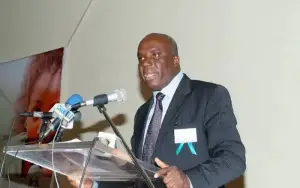The Federal Court of Canada has upheld a controversial ruling that classified Nigeria's two major political parties, the All Progressives Congress (APC) and the Peoples Democratic Party (PDP), as terrorist organizations. The court also denied asylum to Douglas Egharevba, a former member of both parties, citing his decade-long affiliation with the organizations.
Justice Phuong Ngo delivered the judgment on June 17, 2025, dismissing Egharevba's application for judicial review after the Immigration Appeal Division (IAD) found him inadmissible under Canada's Immigration and Refugee Protection Act (IRPA).
According to court documents, the Minister of Public Safety and Emergency Preparedness argued that both the APC and PDP were implicated in political violence, subversion of democracy, and electoral bloodshed in Nigeria.
Decade-Long Political Affiliation
Court records revealed that Egharevba was a PDP member from 1999 to 2007 before joining the APC, where he remained until 2017. He relocated to Canada in September 2017 and disclosed his political history during immigration proceedings.
Canadian immigration authorities subsequently flagged his affiliations, citing intelligence reports that linked both parties to electoral violence and politically motivated killings in Nigeria.
Basis for the Court's Decision
The IAD based its decision largely on the PDP's conduct during the 2003 state elections and 2004 local government polls. The party allegedly engaged in ballot stuffing, voter intimidation, and killing of opposition supporters.
The tribunal found that the party leadership benefited from the violence and took no action to stop it, meeting Canada's legal definition of subversion under paragraph 34(1)(b.1) of the IRPA.
Justice Ngo affirmed that mere membership in an organization linked to terrorism or democratic subversion is sufficient to trigger inadmissibility under paragraph 34(1)(f) of the IRPA, even without proof of personal involvement in violent activities.
Egharevba's claim that political violence was widespread across all Nigerian parties was dismissed by the court. The ruling stated that even flawed Nigerian elections constitute a democratic process under Canadian law, and that undermining them qualifies as subversion.
Implications for the Asylum Seeker
The decision effectively ends Egharevba's asylum claim, with deportation proceedings expected to follow. This ruling could potentially impact other Nigerian asylum seekers with ties to these political parties seeking refuge in Canada.
The case highlights the increasing scrutiny of political affiliations in immigration proceedings and raises questions about how foreign courts view Nigeria's political landscape.
Stay updated with the latest news by following BenriNews on our social media platforms: Facebook, Twitter, LinkedIn, WhatsApp, and Telegram.











